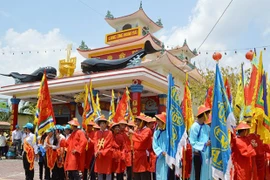The certificate presentation ceremony was heldon April 27 by the provincial Department of Culture, Sports and Tourism and thedistrict People’s Committee.
According to old documents, the Tu Linh (fourmythological creatures – dragon, qilin, tortoise, phoenix) boat racing festivalon Ly Son Island was first held in 1826.
It takes place around the Lunar New Yearfestival to pray for good weather, bumper crops, and peace. It is also meant topay tribute to ancestors who explored this land, as well as the then Hoang Saflotilla that planted sovereignty markers on Hoang Sa (Paracel) and Truong Sa(Spratly) archipelagoes and frequently .
To preserve and bring into play this festival,the Ly Son district People’s Committee conducted many surveys and studies overthe past years to compile a dossier seeking the inclusion of this activity inthe list of national intangible cultural heritage.
The Ministry of Culture, Sports and Tourism madethe recognition in September 2020.
Thanks to this move, Ly Son district iscurrently home to two festivals named national intangible cultural heritages,with the other being “Le khao le the linh Hoang Sa” (Feast and CommemorationFestival for Hoang Sa Soldiers).
The Feast and Commemoration Festival for HoangSa Soldiers this year was held on April 19.
According to Vietnam’s feudal state history, theHoang Sa Flotilla was set up when the Nguyen Lords began their reign in thesouth of the country. Thousands of sailors overcame roaring waves and storms tosurvey sea routes, plant milestones and erect steles affirming nationalterritory in Hoang Sa and Truong Sa archipelagos, and exploit marine resourcesordered by Nguyen Lords. Their missions were full of dangers, and many of themnever returned to land.
To pay tribute to the men enlisted in theflotilla, “Le khao le the linh Hoang Sa” has been observed through hundreds ofyears by families in Ly Son island and many coastal areas in Quang Ngai.
The festival, which is held every April on theisland, was recognised as part of the national intangible cultural heritage bythe State in 2016. It reflects Vietnam’s history of protecting the nationalsovereignty in the East Sea, especially over the Hoang Sa and Truong Saarchipelagos.
Ly Son island covers an area of less than 10sq.km but it has nearly 100 relics, most of which are related to the Hoang SaFlotilla, such as the empty graves built for Hoang Sa soldiers who neverreturned to land, the temples dedicated to Pham Quang Anh and Vo Van Khiet whowere captains of the Hoang Sa Flotilla, and a showroom displaying the items ofthe Hoang Sa Flotilla sailors who also controlled Bac Hai and Ba Ri Lagoon.
A monument and memorial house dedicated to theHoang Sa Flotilla stand near the main road of the island./. /.































